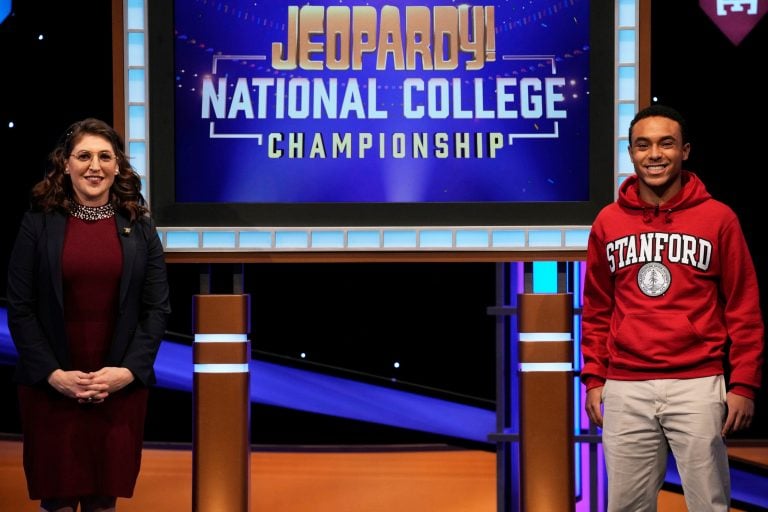On a normal day, Isaac Applebaum ’23 can usually be found in the chemistry lab conducting research. But for the past few months, he has been keeping a secret: beginning on Feb. 8, Applebaum will appear as a contestant on the Jeopardy! National College Championship.
Applebaum will be featured in the first of six quarterfinal episodes, which will air live on ABC. Viewers can watch the episode live or stream it on Hulu beginning on Feb. 9.
At Stanford, Applebaum is not involved in Jeopardy! or quiz bowl–related activities. Instead, he is a biology major hoping to attend medical school. From witnessing his mom’s experiences as a cancer survivor, he said that he “saw firsthand that people who are doctors, people who are oncologists — they can save somebody’s life.” Although Applebaum is studying biology, he said his enjoyment of other subjects is key to his trivia success.
“The secret weapon that I have in terms of knowledge is actually I’m a humanities person,” he said. “I love reading literature. I love history. I love languages. All these different things are also a part of my identity.”
For the junior from Bethesda, Maryland, participation on the show has been long-awaited.
“I’ve been watching Jeopardy! with my family since I was a little kid,” Applebaum said. “We always used to say, ‘Oh, you should be on Jeopardy! It seems like you know a lot of these questions.’ And I actually took that seriously.”
The application process began with a test and an interview, but after not hearing back from the show for months, Applebaum said he figured his opportunity had passed. Then, one day, he got the call: “Out of the blue, I got this call, and it’s from a random Los Angeles number,” he said. “So I’m like, ‘This is really sketchy. This can’t be real.’”
After needing some convincing about the legitimacy of the call, Applebaum was ecstatic at the thought of fulfilling his childhood goal. “I immediately called my parents, and they were really happy,” he remembered.
Filming took place during Thanksgiving break on a historic Los Angeles lot, the same lots where famous shows such as Wheel of Fortune and Shark Tank were filmed, according to Applebaum. As someone who grew up watching those shows, he said it felt like “walking into that history by being there.”
For Applebaum, the highlight of filming was the community he was able to build, both with crew members and fellow contestants. He added that he still shares a group chat with his fellow contestants and that the secrecy of the experience forged a close bond.
“I think one thing that we bonded over is this idea that we couldn’t tell anybody outside of our immediate family for a long time,” Applebaum said. “So we could all talk to each other about all the inside jokes from taping, all of the funny things that happened that we couldn’t tell anybody else about.”
Competing in the show also gave Applebaum more insight into the entertainment industry. He recalled a moment in which filming paused due to technical difficulties, and Jeopardy! host Mayim Bialik held an impromptu question-and-answer session about her career in Hollywood. He also recounted a stage manager giving contestants a Jeopardy! history lesson.
Stanford chemistry professor Robert Waymouth, who is Applebaum’s research mentor, described Applebaum as “the real deal, man. He does it all.”
“Isaac is not only wildly curious, but deeply concerned about his fellow students and how they’re doing,” Waymouth said. “He loves what he’s doing so much. He wants everybody he runs into to have the same enthusiasm that he has.”
Though Waymouth did not previously know that Applebaum enjoyed Jeopardy!, he is confident that Applebaum is “going to nail it.”
Chemistry professor Grant Rotskoff also said Applebaum is “full of surprises.”
“I was quite surprised to see Isaac in the clip that he shared with us about his appearance on Jeopardy!, but because he’s a person with a lot of depth — it sort of made sense in retrospect,” Rotskoff said.
Applebaum said he hopes to use his platform on the show to raise awareness on issues important to him, such as cancer research and diversity in the STEM fields.
